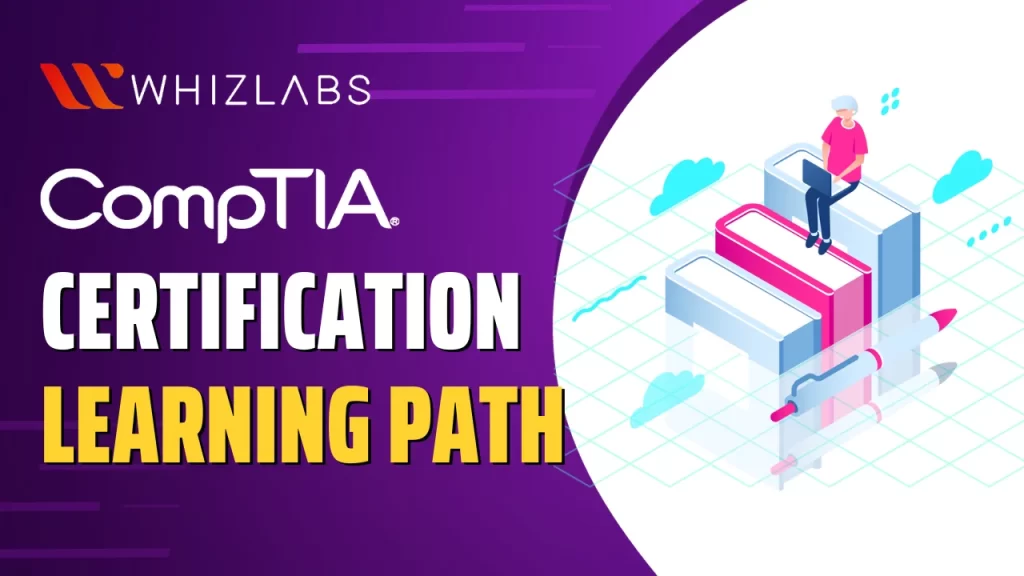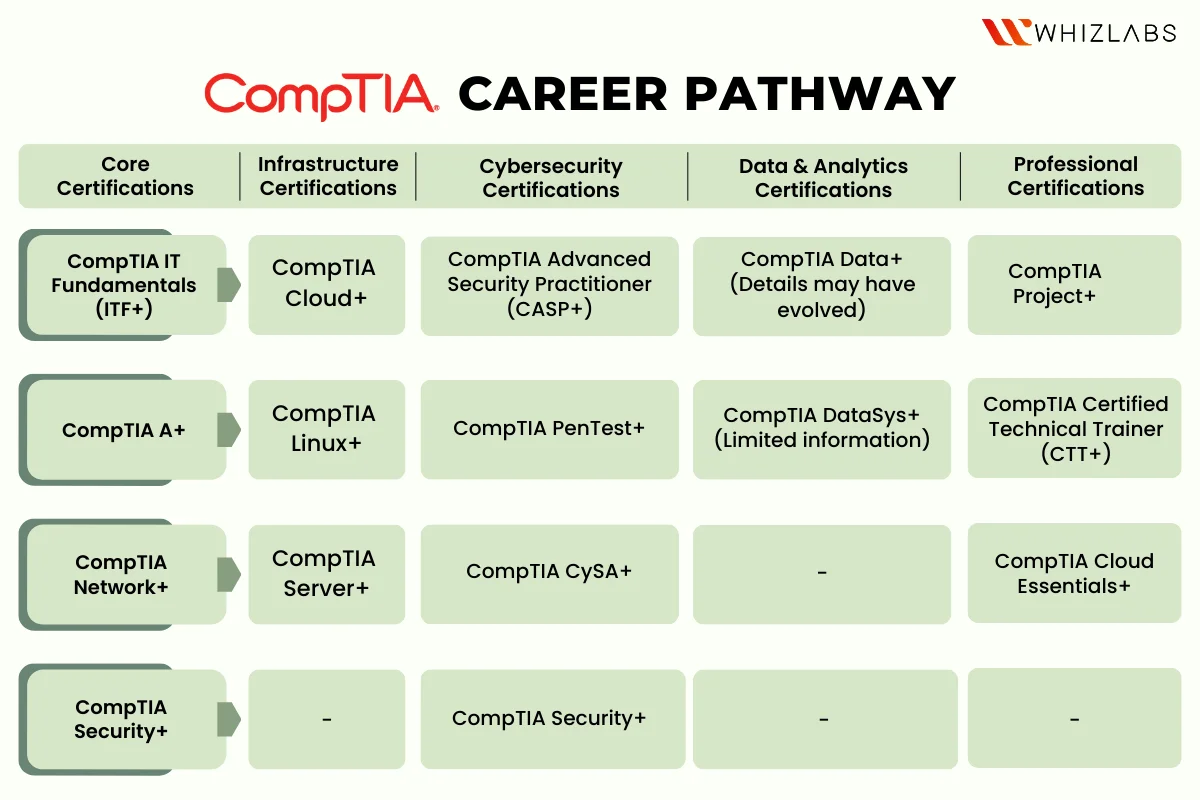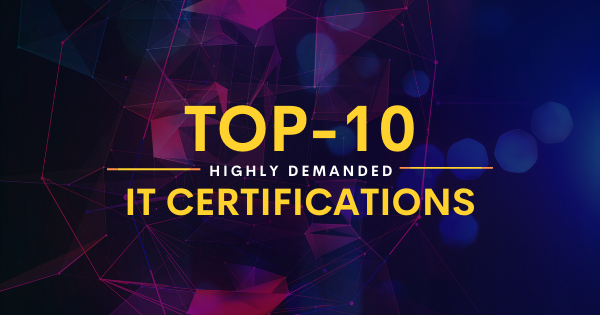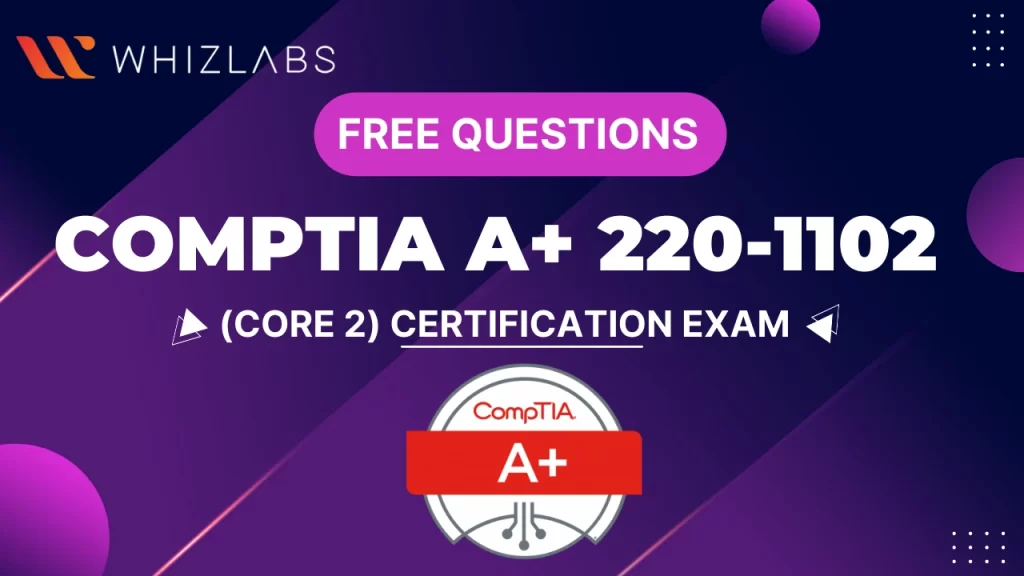Are you ready to embark on a journey to IT expertise and unlock exciting career opportunities? We’ve got you covered!
In this comprehensive guide, we’ll take you through the CompTIA Certification Learning Path, helping you navigate through the various certifications and assisting you in selecting the best ones to propel your IT career forward. The CompTIA Certification Learning Path is designed to equip you with the knowledge and skills necessary to excel in the dynamic world of information technology.
Let’s dive in and explore the array of CompTIA certifications that can empower you to stand out in the field and advance your IT career.
What is CompTIA Certification & why is it important?
CompTIA (Computing Technology Industry Association) certifications are a collection of industry-recognized credentials that validate the skills and knowledge of IT professionals across various domains. These certifications are crucial for career advancement in the ever-evolving world of information technology. Let’s delve into the detailed reasons why CompTIA certifications are important:
Career Advancement
- IT Support Specialist: CompTIA A+ certification is often a requirement for entry-level roles like IT support specialist, help desk technician, or desktop support technician.
- Network Administrator: CompTIA Network+ certification is an essential credential for network administrators, network technicians, and network support specialists.
- Security Analyst: CompTIA Security+ is a foundational certification for cybersecurity professionals, including security analysts, security administrators, and systems administrators.
Skill Validation
You can enrich your skills and knowledge in the following areas:
- Cybersecurity: CompTIA Security+ and CompTIA CySA+ (Cybersecurity Analyst) certifications validate skills in cybersecurity, making them critical for positions such as security analysts and cybersecurity specialists.
- Network Management: CompTIA Network+ is essential for roles involving network design, management, and administration.
- Cloud Computing: CompTIA Cloud+ is valuable for professionals working with cloud technologies and cloud infrastructure.
Continuous Learning
It is a rapidly changing field, and CompTIA certifications require ongoing professional development through Continuing Education Units (CEUs). This ensures that certified professionals stay up-to-date with the latest industry trends and technologies, making them more valuable to employers over time.
Higher Earning Potential
CompTIA certifications are often associated with higher earning potential. For example, CompTIA Security+ certified professionals tend to earn more than non-certified individuals in cybersecurity roles. Similarly, CompTIA Certified IT professionals typically command higher salaries compared to those without certifications.
CompTIA certification salary ranges can vary depending on factors such as the specific CompTIA certification earned, your level of experience, and your location.
Global Recognition
CompTIA certifications are recognized internationally, allowing professionals to work in various geographic locations and markets. This is particularly advantageous for those pursuing careers in global IT companies or considering international job opportunities.
Community and Resources
CompTIA provides a wealth of resources, including forums, communities, and learning materials, that enable certified professionals to connect with peers, learn from one another, and stay updated with industry best practices. This sense of community can be highly beneficial for ongoing professional development.
The CompTIA certification cost varies depending on the specific certification you choose to pursue and the country or region in which you take the exam.
Entry-Level Opportunities
For individuals just starting their IT careers, CompTIA A+ certification is often a prerequisite for positions like IT support specialist, help desk technician, and desktop support. It serves as a stepping stone to more advanced certifications and roles.
They validate expertise, open doors to job opportunities in areas such as cybersecurity, network administration, and cloud computing, and provide a means to stay relevant and competitive in the ever-changing IT industry. Ultimately, CompTIA certifications offer the potential for career growth and higher earning potential across a variety of IT roles.
Also Read: CompTIA vs. CCNA : Which One is Best?
CompTIA Certification Learning Path
The CompTIA Career Pathway is a structured and comprehensive roadmap that helps individuals navigate their careers in the field of information technology (IT).
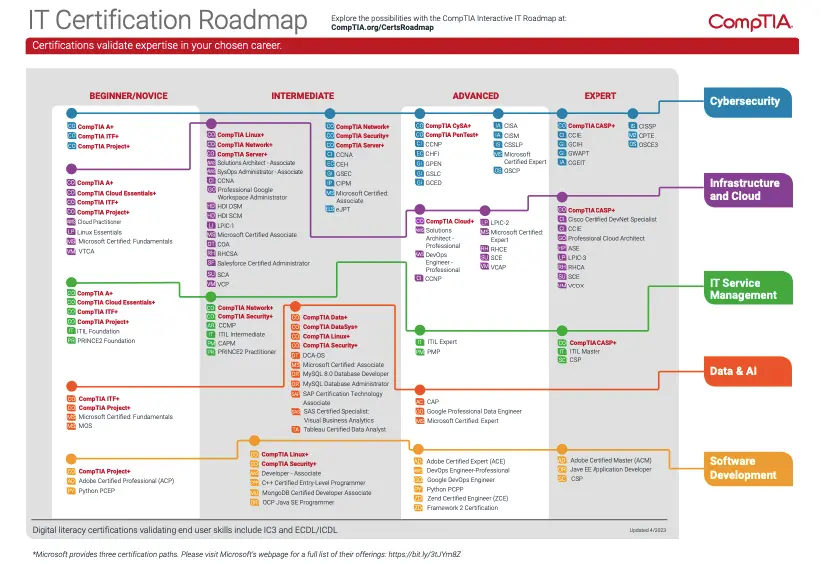
It outlines a series of CompTIA certifications that cover a broad range of IT domains, allowing professionals to build and expand their knowledge and skills in a systematic manner. Here’s an overview of the CompTIA Career Pathway:
Core Certifications
- CompTIA IT Fundamentals (ITF+): An introductory certification covering fundamental IT concepts.
- CompTIA A+: Focused on core IT skills, hardware, software, and troubleshooting.
- CompTIA Network+: Concentrates on networking technologies and practices.
- CompTIA Security+: A foundational certification for cybersecurity professionals.
Infrastructure Certifications
- CompTIA Cloud+: Covers cloud computing concepts and infrastructure.
- CompTIA Linux+: Concentrates on Linux system administration.
- CompTIA Server+: Focused on server hardware and technologies.
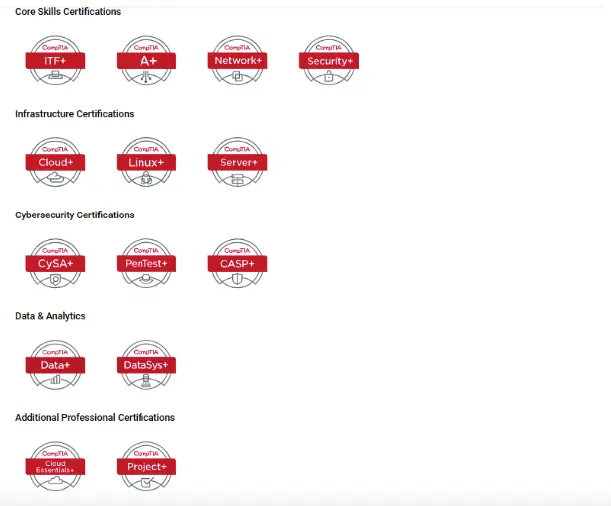
Cybersecurity Certifications
- CompTIA Advanced Security Practitioner (CASP+): A high-level certification for experienced security professionals.
- CompTIA PenTest+: Focused on penetration testing and ethical hacking.
- CompTIA CySA+: Centered on cybersecurity analytics and threat detection.
Data & Analytics Certifications
- CompTIA Data+: A certification related to data and analytics, though specific details might have evolved since my last update.
- CompTIA DataSys+: Information about this certification may not be readily available, and it could be a newer addition to their lineup.
Professional Certifications
- CompTIA Project+: Focused on project management skills in an IT context.
- CompTIA Certified Technical Trainer (CTT+): For individuals interested in becoming effective IT trainers.
- CompTIA Cloud Essentials+: Concentrates on essential cloud computing concepts.
Let’s explore the CompTIA certification roadmap 2024 in detail:
Core Certifications
1. CompTIA IT Fundamentals (ITF+)
CompTIA IT Fundamentals (ITF+) is an entry-level certification designed to provide individuals with a fundamental understanding of information technology. It’s an ideal starting point for anyone who is new to IT and wants to build a foundational knowledge of IT concepts and terminology. Here are the key details about CompTIA IT Fundamentals (ITF+):
What is CompTIA IT Fundamentals (ITF+)?
Purpose: ITF+ is an introductory certification that covers essential IT topics, making it suitable for beginners and those exploring a career in IT.
Knowledge Areas: It includes basic knowledge of hardware, software, operating systems, security, and networking.
Who Can Take CompTIA IT Fundamentals (ITF+)?
ITF+ is intended for individuals who are new to IT and have little to no prior experience in the field. It’s suitable for:
- High school students exploring IT careers.
- Individuals considering a career change to IT.
- Non-technical professionals who want to understand basic IT concepts.
Prerequisites
There are no formal prerequisites for CompTIA IT Fundamentals (ITF+). It is an entry-level certification, and anyone interested can take the exam.
Exam Details
- Exam Code: FC0-U61
- Number of Questions: Typically, there are 75 questions in the exam.
- Question Format: The exam questions are multiple-choice and performance-based.
- Passing Score: The passing score may vary, but it’s generally around 650 on a scale of 900.
- Duration: The exam is timed, and you are usually allowed 60 minutes to complete it.
- Exam Objectives: CompTIA provides a detailed list of exam objectives that cover the topics you need to study. These objectives can be found on the CompTIA website and are a valuable resource for exam preparation.
Skills Required
To successfully earn CompTIA IT Fundamentals (ITF+) certification, you need to acquire a foundational understanding of various IT concepts and skills. Here are the key skills and knowledge areas you should focus on for this certification:
IT Concepts and Terminology
- Understand basic IT terminology, such as hardware, software, firmware, and operating systems.
- Familiarize yourself with key concepts like data storage, input and output devices, and system components.
Computer Hardware:
- Identify and describe different types of computer hardware components, including CPUs, memory, storage devices, and peripheral devices.
- Understand the basic principles of computer assembly and configuration.
Software and Operating Systems
- Learn about various software types, including applications, utilities, and operating systems.
- Recognize different operating systems, their functions, and how to navigate their interfaces.
Networking Fundamentals
- Understand the basics of networking, including concepts like IP addresses, routers, switches, and network protocols.
- Grasp the fundamental principles of Internet connectivity and cloud computing.
Security Awareness
- Be aware of common security threats and risks in the IT environment.
- Learn basic security practices, such as password management, data protection, and recognizing phishing attacks.
Troubleshooting
- Develop problem-solving skills to identify and address common hardware and software issues.
- Understand the troubleshooting process and methodology.
Basic IT Literacy
- Gain a general understanding of IT-related topics, such as data backup and recovery, file management, and peripheral connectivity.
- Be able to explain the importance of IT ethics and professional conduct.
2. Comptia A+
What is CompTIA A+?
CompTIA A+ is designed to validate core IT skills and knowledge, covering a wide range of topics, including hardware, software, networking, and security.
Role: It’s a valuable certification for IT professionals in roles like IT support specialist, help desk technician, and desktop support technician.
Who Can Take CompTIA A+?
CompTIA A+ is intended for individuals who want to establish a career in IT or enhance their existing IT skills. It’s suitable for:
- Entry-level IT professionals.
- Recent graduates pursuing IT careers.
- Those looking to switch to IT from another field.
- IT enthusiasts seeking a strong foundation.
Prerequisites
There are no specific prerequisites for CompTIA A+. However, it’s recommended that candidates have some hands-on experience with computers and IT systems before attempting the certification.
Exam Details
- Exam Code: 220-1001 (Core 1) and 220-1002 (Core 2)
- Number of Questions: Typically, there are around 90 questions per exam.
- Question Format: The exam questions are multiple-choice, drag-and-drop, and performance-based.
- Passing Score: The passing score may vary, but it’s generally around 700 on a scale of 100-900 for each exam.
- Duration: Each exam is timed, and you are usually allowed 90 minutes to complete it.
- Exam Objectives: CompTIA provides a detailed list of exam objectives for both Core 1 and Core 2, covering the topics you need to study. These objectives can be found on the CompTIA website and are a critical resource for exam preparation.
Skills and Knowledge Areas
Candidates for CompTIA A+ should have proficiency in the following areas:
- Hardware: Understand PC components, peripherals, and troubleshooting hardware issues.
- Operating Systems: Be familiar with Windows, Mac, Linux, and mobile OS environments.
- Networking: Comprehend basic networking concepts, protocols, and troubleshooting.
- Security: Understand fundamental security principles and best practices.
- Mobile Devices: Know how to configure, secure, and troubleshoot mobile devices.
- Cloud Computing: Grasp cloud computing concepts and service models.
- Virtualization: Understand virtualization technologies and concepts.
- Troubleshooting: Develop problem-solving skills and diagnostic techniques.
3. Comptia Network+
What is CompTIA Network+?
Purpose: CompTIA Network+ is designed to validate essential networking knowledge and skills, making it a valuable certification for IT professionals specializing in networking.
Role: It is well-regarded for roles like network administrator, network technician, and network support specialist.
Who Can Take CompTIA Network+?
CompTIA Network+ is intended for individuals who have experience or an interest in networking and want to establish or enhance their careers in this field. It’s suitable for:
IT professionals working in network-related roles.
Those seeking careers in network administration and support.
Network enthusiasts looking to formalize their knowledge.
Prerequisites
While there are no strict prerequisites for CompTIA Network+, it is recommended that candidates have prior experience or CompTIA A+ certification, as A+ covers foundational IT knowledge that can be beneficial for Network+.
Exam Details
- Exam Code: N10-008 (The exam code may change over time as new versions are released.)
- Number of Questions: Typically, there are around 90 questions in the exam.
- Question Format: The exam includes multiple-choice, performance-based, and drag-and-drop questions.
- Passing Score: The passing score may vary, but it’s generally around 720 on a scale of 100-900.
- Duration: The exam is timed, and candidates are usually allowed 90 minutes to complete it.
- Exam Objectives: CompTIA provides a detailed list of exam objectives, covering the topics you need to study. These objectives can be found on the CompTIA website and are essential for exam preparation.
Skills and Knowledge Areas
Candidates for CompTIA Network+ should have proficiency in the following areas:
- Networking Concepts: Understand networking terminology, protocols, and models.
- Network Operations: Configure, manage, and troubleshoot networks.
- Network Security: Implement network security best practices and identify security threats.
- Network Topologies and Technologies: Know various network topologies and technologies.
- Networking Tools: Utilize network tools for troubleshooting and maintenance.
- Network Services: Understand services like DHCP, DNS, and NAT.
- Network Management: Configure and manage network devices and services.
4. CompTIA Security+
What is CompTIA Security+?
Purpose: CompTIA Security+ is designed to validate fundamental cybersecurity knowledge and skills, making it a valuable certification for IT professionals specializing in security.
Role: It is well-regarded for roles like security analyst, systems administrator, and network administrator.
Who can take CompTIA Security+?
CompTIA Security+ is intended for individuals who have experience or an interest in cybersecurity and want to establish or enhance their careers in this field. It’s suitable for:
- IT professionals working in cybersecurity-related roles.
- Those seeking careers in security analysis and administration.
- Individuals with an interest in information security.
Prerequisites
While there are no strict prerequisites for CompTIA Security+, it’s recommended that candidates have CompTIA Network+ certification or equivalent networking knowledge, as understanding networking concepts is beneficial for the certification.
Exam Details
- Exam Code: SY0-601 (The exam code may change over time as new versions are released.)
- Number of Questions: Typically, there are around 90 questions in the exam.
- Question Format: The exam includes multiple-choice, performance-based, and drag-and-drop questions.
- Passing Score: The passing score may vary, but it’s generally around 750 on a scale of 100-900.
- Duration: The exam is timed, and candidates are usually allowed 90 minutes to complete it.
Exam Objectives: CompTIA provides a detailed list of exam objectives, covering the topics you need to study. These objectives can be found on the CompTIA website and are crucial for exam preparation.
Skills and Knowledge Areas
Candidates for CompTIA Security+ should have proficiency in the following areas:
- Threats, Attacks, and Vulnerabilities: Understand common cybersecurity threats and vulnerabilities.
- Technologies and Tools: Know security technologies, tools, and best practices.
- Architecture and Design: Understand secure network and system design principles.
- Identity and Access Management: Implement access controls and identity management.
- Risk Management: Assess and mitigate security risks.
- Cryptography and Public Key Infrastructure: Understand encryption and PKI concepts.
- Operations and Incident Response: Implement security operations and incident response procedures.
Infrastructure Certifications
Here are details about CompTIA Cloud+, CompTIA Linux+, and CompTIA Server+ certifications:
1. CompTIA Cloud+
What is CompTIA Cloud+?
CompTIA Cloud+ is a certification that validates the skills and knowledge needed to maintain and optimize cloud infrastructure services. It covers various cloud service models and deployment scenarios.
Who Can Take CompTIA Cloud+?
CompTIA Cloud+ is designed for IT professionals working with cloud technologies, cloud administrators, and those responsible for cloud infrastructure.
Prerequisites
While there are no strict prerequisites, it’s recommended to have CompTIA Network+ and/or CompTIA Server+ knowledge, as well as some experience with networking and storage technologies.
Exam Details
- Exam Code: CV0-003 (The exam code may change over time with new versions).
- Number of Questions: Typically around 90 questions.
- Question Format: The exam includes multiple-choice and performance-based questions.
- Passing Score: The passing score may vary, but it’s generally around 750 on a scale of 100-900.
- Duration: Candidates are usually allowed 90 minutes to complete the exam.
Skills and Knowledge Areas
- Cloud Concepts and Models
- Virtualization
- Infrastructure
- Storage
- Networking
- Security
- Resource Management
- Business Continuity in the Cloud
2. CompTIA Linux+
What is CompTIA Linux+?
CompTIA Linux+ is a certification that verifies essential skills for Linux system administration and operation. It covers Linux distributions and command-line skills.
Who Can Take CompTIA Linux+?
CompTIA Linux+ is designed for IT professionals working with Linux-based systems, including Linux administrators and Linux support specialists.
Prerequisites
There are no strict prerequisites, but it’s recommended to have some basic knowledge of Linux or to have completed CompTIA A+ or CompTIA Network+.
Exam Details
- Exam Code: XK0-004 (The exam code may change with new versions).
- Number of Questions: Typically around 90 questions.
- Question Format: The exam includes multiple-choice and performance-based questions.
- Passing Score: The passing score may vary, but it’s generally around 720 on a scale of 100-900.
- Duration: Candidates are usually allowed 90 minutes to complete the exam.
Skills and Knowledge Areas
- System Configuration
- Command-Line Interfaces
- Linux Installation and Package Management
- File Permissions
- Linux Security
- Linux Troubleshooting
- Shell Scripting
- Basic Networking Configuration
3. CompTIA Server+
What is CompTIA Server+?
CompTIA Server+ is a certification that validates skills and knowledge related to server hardware and software technologies. It covers server installation, configuration, maintenance, and troubleshooting.
Who Can Take CompTIA Server+?
CompTIA Server+ is designed for IT professionals working with server technologies, including server administrators and network administrators.
Prerequisites
There are no strict prerequisites, but it’s recommended to have CompTIA A+ certification or equivalent knowledge.
Exam Details
- Exam Code: SK0-005 (The exam code may change with new versions).
- Number of Questions: Typically around 90 questions.
- Question Format: The exam includes multiple-choice and performance-based questions.
- Passing Score: The passing score may vary, but it’s generally around 750 on a scale of 100-900.
- Duration: Candidates are usually allowed 90 minutes to complete the exam.
Skills and Knowledge Areas
- Server Hardware Installation
- Server Operating Systems
- Server Roles
- Virtualization
- Storage Solutions
- Security
- Disaster Recovery
- Troubleshooting Server Issues
Also Read : Top 5 In-Demand Jobs for Professionals with CompTIA Security+ Certification
Cybersecurity Certifications
1. CASP+
What is CompTIA Advanced Security Practitioner (CASP+)?
CASP+ is an advanced certification for experienced IT professionals focusing on cybersecurity.
Who Can Take CASP+?
Experienced IT professionals working in cybersecurity or related fields.
- Prerequisites
- CompTIA Security+ or equivalent experience
Exam Details
The exam is comprehensive, featuring multiple-choice and performance-based questions.
Skills and Knowledge Areas
It covers advanced security topics, including risk management, enterprise security solutions, and security controls.
2. CompTIA CySA+
- Purpose: CySA+ certifies skills in threat detection and response.
- Knowledge Areas: It includes threat detection techniques, vulnerability management, and security analysis.
Who Can Take CySA+?
Individuals aiming to work in cybersecurity roles with an emphasis on security analysis.
- Prerequisites: CompTIA Security+ or equivalent experience.
- Exam Details: The exam assesses your ability to analyze and respond to cybersecurity threats.
- Skills Required: Strong analytical skills and the ability to identify and respond to security threats.
Data & Analytics Certifications
1. CompTIA Data+
- Purpose: Data+ is designed for those interested in data-related careers, covering data management and analytics.
- Knowledge Areas: It includes data storage, management, and analytics principles.
- Who Can Take Data+: Aspiring data professionals or those looking to enhance their data skills.
- Prerequisites: None required.
- Exam Details: Focuses on data-related concepts and principles.
- Skills Required: Understanding data storage, management, and basic analytics.
Professional Certifications
1. CompTIA Project+
What is CompTIA Project+?
CompTIA Project+ is a unique industry certification specifically crafted to provide entry-level IT professionals with the essential skills required to effectively manage small to medium-sized projects.
Who Can Take Project+?
Individuals involved in project management or seeking to enter the field.
Prerequisites
It is recommended to have at least 6–12 months of hands-on experience in IT project management.
Exam Details
- Exam Code: PK0-005
- Number of Questions: Maximum of 90 questions
- Type of Questions: Multiple-choice (single and multiple response) and performance-based
- Length of Test: 90 Minutes
- Passing Score: 710 (on a scale of 100-900)
Skills and knowledge areas
- Project basics
- Project constraints
- Communication and change management
- Project tools and documentation
- Proficiency in project planning, execution, and closure.
2. CompTIA PenTest+
What is CompTIA PenTest+?
CompTIA PenTest+ is an ideal choice for cybersecurity professionals who are involved in penetration testing and vulnerability management.
Who Can Take PenTest+?
Ethical hackers and security professionals.
Prerequisites
While there is no specific prerequisite for CompTIA PenTest+, it is highly recommended that candidates have a foundational understanding of network and security concepts. This can be achieved through having CompTIA Network+ and CompTIA Security+ certifications or equivalent knowledge.
Additionally, candidates should ideally possess a minimum of 3-4 years of practical, hands-on experience in information security or related fields. CompTIA PenTest+ is designed to build upon this prior knowledge and experience, offering a technical, hands-on focus in the realm of penetration testing and ethical hacking.
Exam Details
- Exam Code: PT0-002
- Launch Date: October 28, 2021
- Number of Questions: Maximum of 85 questions
- Type of Questions: Performance-based and multiple choice
- Length of Test: 165 minutes
- Passing Score: 750 (on a scale of 100-900)
Skills and knowledge areas
- Planning and Scoping
- Information Gathering and Vulnerability Scanning
- Attacks and Exploits
- Reporting and Communication
- Tools and Code Analysis
3. CompTIA DataSys+
What is CompTIA DataSys+?
CompTIA DataSys+ is a foundational level data management certification and it primarily covers data administration logistics and security.
Who can take CompTIA DataSys+?
Those who want to explore the Data administrator role can take this course.
Prerequisites
No prerequisites required to take this course but 2-3 years of working experience in a database administrator role is beneficial.
Exam details
- Exam Codes: DS0-001
- Launch Date: July 18, 2023
- Number of Questions: A maximum of 90 questions
- Type of Questions: Multiple-choice and performance-based
- Length of Test: 90 Minutes
- Passing Score: 700 (on a scale of 100 to 900)
Skills and Knowledge Areas
- Database Fundamentals
- Database Deployment
- Database Management and Maintenance
- Data and Database Security
- Business Continuity
4. CompTIA Certified Technical Trainer (CTT+)
What is CompTIA Certified Technical Trainer (CTT+)?
CTT+ certification confirms the understanding and effective utilization of tools and techniques essential for teaching in modern learning environments.
Who Can Take CTT+?
Aspiring technical trainers.
Prerequisites
It is recommended to have 6 – 12 months of trainer or instructor experience
Exam Details
Passing score: 655
Skills and knowledge areas
The CTT+ certification exam assesses teaching expertise both inside and outside the classroom, covering areas such as preparation, facilitation, and evaluation of physical or virtual classroom environments.
5. CompTIA Cloud Essentials+
What is CompTIA Cloud Essentials+?
Prerequisites
It is recommended to have six months to a year of work experience as a business analyst in an IT industry with exposure to cloud technologies.
Exam Details
- Exam Code: CLO-002
- Launch Date: November 2019
- Number of Questions: Maximum of 75 questions
- Type of Questions: Multiple choice
- Length of Test: 60 Minutes
- Passing Score: 720 (on a scale of 100-900)
Skills Required
Understanding network security, compliance, and threat management.
6. CompTIA Security+
What is CompTIA Security+?
Security+ is an entry-level certification for IT professionals emphasizing cybersecurity.
Who Can Take Security+?
Security+ is taken by the IT professionals looking to start a career in cybersecurity.
Prerequisites
It is recommended to have six months to a year of work experience as a business analyst in an IT industry with exposure to cloud technologies.
Exam Details
- Exam Code: SY0-601 (Valid from November 12, 2020) and SY0-701 (Valid from November 7, 2023)
- Number of Questions: Up to 90 questions
- Type of Questions: Multiple choice and performance-based
- Length of Test: 90 minutes
- Passing Score: 750 (on a scale of 100-900)
Skills Required
Understanding network security, compliance, and threat management.
FAQs
How long are the CompTIA certifications valid?
The CompTIA certification validity is three years from the date you have passed your certification exam.
How long does it take to learn CompTIA?
The time it takes to learn CompTIA certifications can vary based on your prior knowledge and the amount of time you can dedicate to study. Generally, studying for ten to fifteen hours per week should typically prepare you for the exams within three to five months. However, if you are new to the field and require more experience, your learning journey may take longer.
What CompTIA certification to start with?
If you’re considering beginning a career in IT, especially with the goal of entering the field of cybersecurity, then you can consider CompTIA A+ as your starting point.
Does CompTIA require coding?
Coding is not required to begin your cybersecurity career.
Can CompTIA get you a job?
Nowadays, many firms are hiring cybersecurity professionals to secure their valuable assets. And thus it increases the soaring demand for cybersecurity professionals.
Conclusion
The CompTIA certification learning path is a versatile and comprehensive roadmap that offers a wide array of options for individuals aspiring to excel in the ever-evolving field of information technology.
Whether you’re launching your IT career, climbing the corporate ladder, or embarking on a journey of specialization, the CompTIA certification learning path is your trusted companion on the road to success.
So, chart your course, embrace the challenges, and set your sights on a future filled with exciting IT opportunities.
- Study Guide DP-600 : Implementing Analytics Solutions Using Microsoft Fabric Certification Exam - June 14, 2024
- Top 15 Azure Data Factory Interview Questions & Answers - June 5, 2024
- Top Data Science Interview Questions and Answers (2024) - May 30, 2024
- What is a Kubernetes Cluster? - May 22, 2024
- What are the Roles and Responsibilities of an AWS Sysops Administrator? - March 28, 2024
- How to Create Azure Network Security Groups? - March 15, 2024
- What is the difference between Cloud Dataproc and Cloud Dataflow? - March 13, 2024
- What are the benefits of having an AWS SysOps Administrator certification? - March 1, 2024

